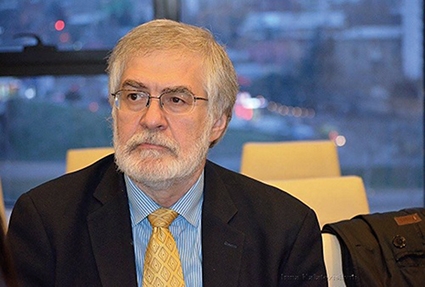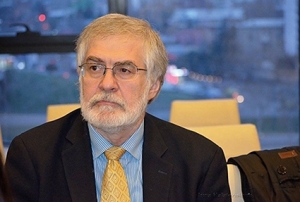Georgia & its Communist Legacy
Exclusive Interview
In 1991, Georgia turned its back on the USSR. But just because Georgia opened it borders to a free market and removed its “Stalin status” does not mean that the country is free from its past. 70 years as a Soviet Republic has left a strong legacy in society here, maybe less visible than status, but harder to remove. That is what we call “post communism,” i.e. how former soviet countries face and manage their post USSR national blueprint. Ghia Nodia is a professor from the Ilia State University, whose field of study is nationalism, democracy and regional security. Academic work remains the main part of his working life, and he briefly held the post of Minister of Education in 2008. He gave GEORGIA TODAY an exclusive insight into the communist legacy still alive in Georgia today.
How did people react when the national borders opened?
Well, people were at the beginning reluctant to see such a change, first because it was a change in their everyday lives, then because it occurred while the civil war was ravaging the economy. Of course, the breakdown of the communist system initially led to economic disaster and society needed time to restore growth. People struggled to make a difference between market results and the national disruption.
What is the strongest remaining communist legacy here?
First, I would say that people feel somewhat distanced from state institutions. The State is something seen as negative, even repressive, in Georgia and society feels isolated from it. There is no doubt that the reasons for it can be found in the history of its having been a “colonized” country. For instance, if you have a case to fix with someone, you don’t sue him, you negotiate directly. People distrust the Georgian justice system and find it awkward to call the police, seeing it as a betrayal.
Then, people suffer from a lack of autonomy. During the USSR, everything wrong outside your apartment door would be tackled by the regime. The State provided you everything you needed. When the USSR collapsed, people were told “now you’re independent, you have to solve your problems by yourself.” People are still not used to it. For instance, after 1991, when elevators broke people sat waiting for state intervention, but nothing happened. So, they learnt how to manage it alone, or together as a collective. But at the beginning it was quite hard, with debates and tensions. In Georgia, contrary to western European countries, individualism is something positive. As a result of 70 years of communism, personal development and responsibilities given by individualism are a thing people agree on and support.
There is also a lack of societal pluralism. The communist system was “classless,” which means that today many struggle to understand their place in society. And there is no real pluralism in social forces and interests. People are socially aggregated, and do not understand what societal pluralism means, or why we might need it.
And nationalism?
Nationalism is also a legacy of communism. Paradoxically, nationalism was stronger in soviet countries than in capitalist countries during the Cold War. Nationalism has a bad reputation in western countries, but not here, and Georgia will definitely turn toward it. The key question is what kind of nationalism Georgia will vote for. They are two nationalisms here: civic and republican nationalism, versus ethnic nationalism. The latter is exclusive, the first not. “Georgia for Georgians” could epitomize the idea. This more traditional nationalism used to be friendly, with Russia considering that the threat came from Muslims and Europe. Civic nationalism, on the other hand, is critical of Russia and pro-western in nature.
I think nationalism becomes a problem when it blinds people. When I was Minister of Education in 2008, we were fighting this blindness: the policy then was to try to teach history differently, from several points of view, including sources to allow students to be critical. But some people, in particular the Church, thought we were not nationalist enough by doing so.
What do the Georgian people miss most about the USSR?
Some people still miss the communist system for its “minimal healthcare education.” It was highly efficient for dealing with many illnesses. But Georgia has implemented a more efficient healthcare system since 2014.
By Antoine Dewaest












